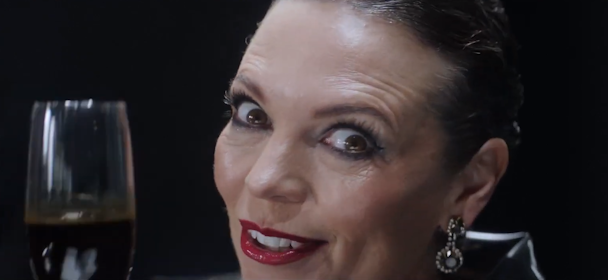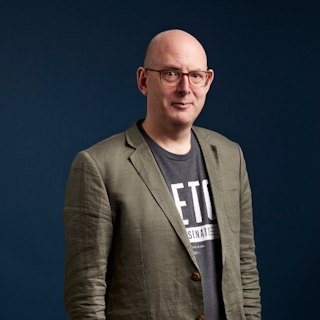Morality v hypocrisy: Where does adland draw the line?
What’s the difference between a ‘good’ client and a ‘bad’ client? Kevin Chesters tugs on that uncomfortable yarn ball and reveals some home truths about the advertising industry.

Oblivia Colemine / Lucky Generals
“Don’t tell my mum I work in advertising. She thinks I play piano in a brothel”. Jacques Sequala, 1979
This line from the legendary French adman nods to the negative perception of the ad industry (especially the self-flagellating way we tend to view ourselves).
Jacques is still with us (unlike his agency RSCG, absorbed into Havas in 1996), and so is this debate about the industry’s conscience, morality, and reputation.
Now, we’re all soon off for the Christmas holidays, where anyone who works in the industry will inevitably be confronted by a friend and relative with a strong opinion about the world of advertising – probably conflating it with working for Voldemort or Ming the Merciless.
It got me thinking about how we view what we do for a living, especially our attitude toward the sectors we work on and those we consider a bit iffy. Over the years, especially as a senior leader, I have gotten into these conversations about what we would/wouldn’t work on for ‘moral reasons.’
Advertisement
It seemed like a cat’s cradle of contradiction (or maybe hypocrisy).
This week, I was especially thinking about the (brilliant) film featuring “Oblivia Coalmine” for Make My Money Matter, highlighting the issue of UK pension companies investing in fossil fuels. Our industry has identified a few ‘no-no’ accounts that cross the line: cigarettes, fossil fuels, payday loans, sometimes gambling, and anything to do with the arms industry.
Now, I’m not calling out any agency or criticizing anyone individually for what they will or won’t work on. It’s a matter of opinion and individual red lines. But if there’s one thing that I can’t stand, it is finger-wagging because I find this debate more than a little confusing.
An ex-colleague was talking recently about her inner conflict of freelancing, for perfectly reasonable and understandable financial reasons, on a tobacco account. It seemed to really bother her.
People or agencies generally won’t work on these accounts but will happily work on alcohol accounts. This is strange. Alcohol is the biggest risk factor for death, ill health and disability among under 50s in the UK. It is the fifth biggest risk factor across all ages.
Why is one angel and the other demon?
Advertisement
The same people or agencies that won’t pitch for or work on fossil fuel accounts will happily work on auto accounts. 85% of all cars on UK roads still run on petrol or diesel – where do you think that comes from? You can argue all you want about the transition to electric. Still, it seems weird that there isn’t even the start of a debate about the morality or conscience of agencies who have car accounts - but would vilify people for working on ‘big oil.’
I never heard of an agency refusing on ethical grounds to work for an airline – yet the airline industry is responsible for 2.5% of all global carbon emissions (for context on that number, the whole of the UK represents less than 1%).
The same agency that did the Oblivia film (an agency I love and respect from their founders to their reel) did ads for Virgin Atlantic and Amazon.
Where is this moral line drawn?
Meanwhile, when I was at W+K London, the creds stated that we would only work with “good companies.” We refused even to entertain new business chats with the likes of Wonga, Ladbrokes, or Shell. Yet we worked on Coca-Cola and Nestlé (not exactly known for being squeaky clean, eh?). We also had a famous car account. And an airline via our global parent agency.
See what I mean?
Suggested newsletters for you
I’m not being contrarian, and genuinely, I'm not calling anyone out but we need to start asking ourselves some strong questions when it comes to industry moralizing. Like most issues, this is a lot more nuanced and complicated than some might like to think.
When I was at Ogilvy, I was working on projects for WWF, Greenpeace, and BP at the same time. It seemed paradoxical (hypocritical?) until... I realized that the only people who can solve an energy crisis are energy companies, the only ones with the resources or skillset to transition us to a new energy world. Governments certainly never will.
This is clearly a morality maze. And it's hard to navigate.
Many of us would object to working on the Daily Mail or GB News, but we’d happily work on Meta or TikTok (spreading the very same content). The same people who object to ciggies or vapes are fine with fast food accounts or food delivery companies (25% of UK adults are now classed as obese, and obesity costs the NHS £7bn a year). We have no issue working on beauty accounts that have done more to drive mental health issues in young people than most things out there. We wouldn’t work on payday loans, but we will work on banks (financing and funding a lot of the fossil fuel, global arms, or nefarious governments we strenuously object to). We won’t work on gambling accounts, but we’d work on the sports organizations they fund. Ditto, we’d probably work on the airlines or sporting properties that a lot of the more morally questionable government sovereign wealth funds bankroll!
Then, we come to the foundations and fabric of the industry at large. It is an industry entirely dependent on continued global growth and consumption. Most of what we advertise isn’t something people need; it is things that people want or want more of. Do we have a right to have any kind of conscience or do any kind of moralizing when the very basis of what we get paid to do is technically fuelling (often literally) the biggest crisis facing humanity – namely, the climate emergency?
We should continually ask the question of what is right and wrong. Challenge ourselves as to what we should or shouldn’t be doing. We should 100% use the reach we have to apply our skills to raising the right issues in the right way to help solve the biggest challenges our species faces.
But let’s not get too self-righteous or pearl-clutchy about it all. And let’s take a harder look at what we, or our agencies, say yes to when we want to get on our moral high horses about what we loudly or publicly say no to. Otherwise, we not only open ourselves up to accusations of hypocrisy but also to ridicule, which could undermine a lot of the good intentions we all have to do no evil in our day jobs in the first place.

